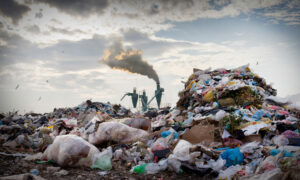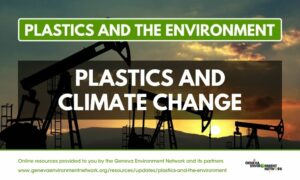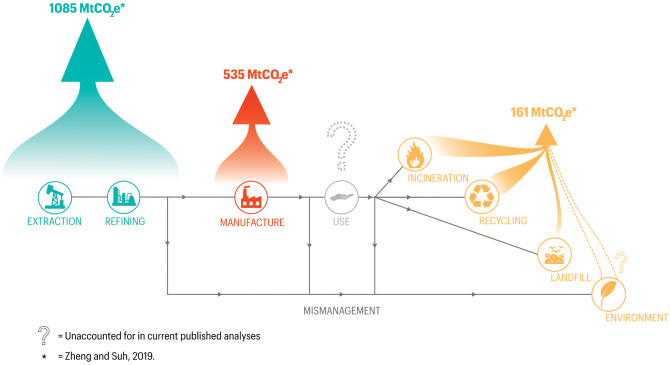Update
Plastics and Climate Change | Plastics and the Environment Series
As 99% of plastics are made from fossil feedstocks, plastic pollution is indubitably linked with climate change. This page is part of our Plastics and the Environment series, a set of online resources on the plastics crisis, its impact on people and the environment, and international cooperation to address this global problem. They include resources and news from organizations in Geneva and beyond, including UN-system organizations and other IOs, governmental authorities, civil society organizations, academic institutions and journals, and renowned newspapers.
The world is facing a plastics crisis. Plastic pollution is found all around the globe. Plastics are negatively affecting people and the environment at each stage of their lifecycle – extraction of fossil fuel, production, manufacturing, use, recycling, and disposal. The impacts are felt in a wide range of areas, including on biodiversity, climate change, human health and human rights. This page focuses on the strong links between plastics and climate change.
Plastics and the Fossil Industry
As 99% of plastics are created from fossil fuel feedstocks, plastic production is closed linked to the petrochemical industry. Petrochemicals are expected to become the largest driver of global oil demand growth from now through 2030. While the international community is striving to address climate change by moving away from fossil fuels in the energy and transportation sectors, plastics should not be forgotten, as they are tightly linked to the fossil industry.
Plastic’s Contribution to Climate Change
Plastics are threatening the ability of the global community to keep global temperature rise below 1.5°C, as greenhouse gases (GHG) are emitted throughout the plastic life cycle. Indeed, extraction, refining and manufacture of plastics are all carbon intensive activities. In 2015, CO2 and other GHGs emissions from plastic production reached 1.96 Gt of CO2e, for a cost of $341 billion annually (Minderoo-Monaco Commission on Plastics and Human Health, 2023) At the disposal stage, incineration of plastic waste releases significant GHG into the atmosphere, alongside toxic pollutants. Other disposal methods, including recycling, also come with their share of GHG emissions. The rapid global growth of the plastic industry, largely fueled by natural gas, undermines efforts to reduce carbon pollution and prevent a climate catastrophe. Estimates indicate that GHG emissions from plastics could reach about 13% of the entire remaining carbon budget by 2050 (CIEL, 2019). Without a plastic cap, OECD projects GHG emissions from plastic to increase to 4.3 Gt CO2e. Plastic in the oceans may also interfere with the oceans capacity to absorb and sequester carbon dioxide, thus creating another pathway through which plastic pollution contributes to accelerate climate change. Various ecosystems, such as the ocean and mountain areas, are particularly vulnerable to both climate change and plastic pollution, and the combination of both is a significant stress factor on biodiversity.
Further resources on how plastics contribute to climate change:
- Climate Impact of Primary Plastic Production | Karali Nihan; Khanna Nina and Shah Nihar | Lawrence Berkeley National Laboratory | 17 April 2024
- Climate Impacts of Plastics: Global Actions to Stem Climate Change and End Plastic Pollution | GRID-Arendal | 29 February 2024
- Health Effects of Fossil Fuel–Derived Endocrine Disruptors | Tracey J. Woodruff | The New England Journal on Medicine | 7 March 2024
- Climate change impacts of plastics | Scientists’ Coalition for an Effective Plastics Treaty | 12 July 2023
- Nonviable carbon neutrality with plastic waste-to-energy | Serang Kwon, Jieun Kang et al. | Energy & Environmental Science | 19 June 2023
- What do plastics have to do with climate change? | UNDP | 15 November 2022
- The fundamental links between climate change and marine plastic pollution | Helen V.Ford et al. | Science of the Total Environment | 1 February 2022
- Outside the Safe Operating Space of the Planetary Boundary for Novel Entities |L. Persson, B. M. Carney Almroth, C. D. Collins, S. Cornell, C. A. de Wit, M. L. Diamond, P. Fantke, M. Hassellöv, M. MacLeod, M. W. Ryberg, P. Søgaard Jørgensen, P. Villarrubia-Gómez, Z. Wang, and M. Zwicky Hauschild | Environmental Science & Technology 2022 56 (3), 1510-1521 | January 2022
- 6 reasons to blame plastic pollution for climate change | World Bank Blog | 6 November 2021
- Microplastics are in the air we breathe and in Earth’s atmosphere, and they affect the climate | The Conversation | 20 October 2021
- Plastic is part of the carbon cycle and needs to be included in climate calculations | Xia Zhu, University of Toronto | 28 February 2021
- Geneva Beat Plastic Pollution Dialogues – Plastics, Climate and Air Pollution | Geneva Environment Network | 10 December 2020
- How plastics contribute to climate change | Brooke Bauman | Yale Climate Connections | 20 August 2020
- More plastic is on the way: What it means for climate change | Renee Cho, Earth Institute, Columbia University | 21 February 2020
- Plastic & Climate: The Hidden Costs of a Plastic Planet | CIEL | May 2019
- Double trouble: plastics found to emit potent greenhouse gases | UNEP News | 24 August 2018
Jointly Addressing Plastic Pollution and Climate Change
A comprehensive response to the threats of climate change includes consideration of the role of plastics in the carbon budget. Reducing the overall use of plastic and eliminate non-necessary plastics would thus help jointly tackle the climate and plastic pollution crises. As our planet is a highly interconnected system, one must also ensure that solutions to the plastic crisis do not have a negative impact on climate change. In that regard, the transformation of plastic waste into fuel, while sometimes presented as a solution to better manage plastic waste, fails to address climate change concerns. At the UN climate negotiations in Egypt in November 2022 (UNFCCC COP27), various actors are advocating for stronger recognition of the interlinkages between plastics and climate change and urgent action to reduce plastic production and address the impacts of plastic on climate.
- WHO Asks Member States: Join Talks on Global Plastics Treaty, Up Game in Climate Action for Health | Health Policy Watch | 27 January 2024
- Reducing Plastic Production to Achieve Climate Goals: Key Considerations for the Plastics Treaty Negotiations | CIEL | 25 September
- Petrochemicals and climate change: Powerful fossil fuel lock-ins and interventions for transformative change | Fredric Bauer, Joachim Peter Tilsted, Carolyn Deere Birkbeck, et. al. | Environmental and Energy Systems Studies, Lund University | 24 May 2023
- Experts say COP27’s ‘plastic waste pyramid’ is focusing on the wrong solution | Grist | 14 November 2022
- UN agencies at COP27 urge action to tackle impact of plastic on climate | UNCTAD | 11 November 2022 | See also news from the BRS Secretariat
- Plastics & Refuse-Derived Fuel: Fuel Product or Plastic Waste Export? | BRS COPs Side Event & Geneva Beat Plastic Pollution Dialogues | IPEN & Geneva Environment Network | 9 June 2022
- Plastic Waste Fuels | IPEN | 1 March 2022
- Climate Change: Don’t sideline plastic problem, nations urged | BBC News | 28 September 2021
- Plastique et climat, même combat? | Alternatiba Léman & Geneva Beat Plastic Pollution Dialogues | 1 September 2021
GEN Events

Launch and Panel Discussion | Climate Impacts of Plastics: Global Actions to Stem Climate Change and End Plastic Pollution
20 March 2024
GRID-Arendal & Geneva Environment Network

Plastique et climat, même combat? | Alternatiba Léman & Geneva Beat Plastic Pollution Dialogues
1 September 2021
Maison Internationale des Associations

Geneva Beat Plastic Pollution Dialogues | Plastics, Climate and Air Pollution
10 December 2020
Geneva Environment Network
More on the Plastics Crisis
Our special series “Plastics and the Environment” provides resources on the status of the global plastic pollution, its impact on people and the environment, and international cooperation to address the plastics crisis.



